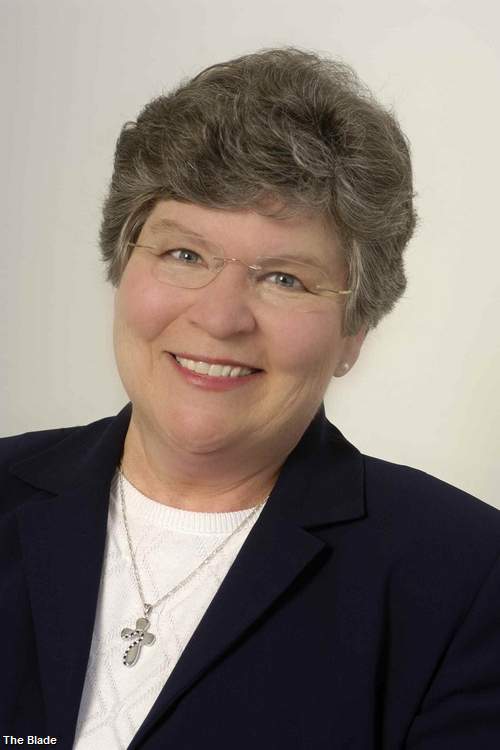Rome Is Asked to Cease Secrecy in Investigations
By David Yonke
Toledo Blade
September 8, 2009
http://toledoblade.com/apps/pbcs.dll/article?AID=/20090908/NEWS10/909080334/-1/TECH
A major U.S. Catholic nuns' group, voicing concern over two ongoing Vatican investigations, is asking Rome for more information and less secrecy.
At the same time, an Ohio-based Catholic reform group is encouraging lay people to write letters of support for nuns to church officials, including Toledo Bishop Leonard Blair, who is heading one of the inquiries.
 |
| Blair |
The Leadership Conference for Women Religious, which represents 95 percent of the nation's approximately 60,000 nuns, issued a statement after its annual assembly last month criticizing the Vatican for "a lack of full disclosure about the motivation and funding sources for the studies."
The group also said leaders of women's religious orders "object to the fact that their orders will not be permitted to see the investigative reports about them that are submitted directly to the Vatican."
To rally support for U.S. nuns, the Cleveland-based group FutureChurch is encouraging Catholics to write letters testifying of their positive experiences with nuns, "as well as their dismay and confusion" over the investigations.
The first Vatican inquiry, announced eight months ago, involves an "apostolic visitation" that will "look into the quality of the life of women religious in the United States." Heading the inquiry is Mother Mary Clare Millea of Hamden, Conn., superior general of the Apostles of the Sacred Heart of Jesus.
 |
| Schenk |
The second investigation, headed by Bishop Blair, was announced in April and will assess the Leadership Conference's ad-herence to Catholic doctrine.
Cardinal William Levada of the Vatican's Congregation for the Doctrine of the Faith said in a letter to the Leadership Conference that the assessment is needed because the organization has not heeded a warning given eight years ago citing three issues of concern: a male-only priesthood, homosexuality, and salvation through Christ alone.
"Given both the tenor and the doctrinal content of various addresses" at Leadership Conference assemblies, the problem has not been fixed, Cardinal Levada said.
Bishop Blair declined a request from The Blade for an interview on the doctrinal assessment.
The Vatican said its apostolic visitation is intended "as a constructive assessment and an expression of genuine concern for the quality of life" of nuns in the United States. But questions included in visitation documents also assess "the soundness of doctrine held and taught" by the sisters.
The nature of some of those questions seems to validate concerns expressed privately by some sisters that they're about to be dressed down or accused of being unfaithful to the church.
The report, for example, asks communities of nuns to lay out "the process for responding to sisters who dissent publicly or privately from the authoritative teachings of the church."
Conservative Catholics have long complained that the majority of sisters in the United States have grown too liberal and flout church teaching.
Some have taken provocative stands, advocating for female priests or challenging church teaching against abortion rights or gay marriage.
Sister Christine Schenk of Cleveland, a Sister of St. Joseph and director of FutureChurch, said American nuns have taken to heart the mandates of the Second Vatican Council and have worked diligently to update their congregations accordingly.
"I do feel very confident that my own congregation, and leaders of the congregations of other religious orders I interacted with at the LCWR assembly, have done what the church has asked us to do," Sister Christine said. "But the point of tension comes when the ministry of women religious, being faithful to that vision, has taken us beyond the comfort zone of some church leaders," she said.
Richard Gaillardetz, a theologian and professor of Catholic studies at the University of Toledo, said the Pope and the Vatican are responsible for preserving the unity of the faith.
"Consequently, it is appropriate for the Vatican to take reasonable measures to preserve a positive relationship with women's religious communities," he said. "What is objectionable to many, including myself, is the way these investigations are being conducted."
For example, he said, individual sisters have been encouraged to file confidential complaints with the Vatican about perceived problems in their communities.
The nuns' religious orders will not have an opportunity to respond to such complaints nor see the visitation reports submitted to the Vatican.
Sister Christine said the lack of disclosure is one of the most troubling aspects of the investigations.
"It's just simple due process," she said. "If someone has an issue, if people are distressed or upset, why not approach the religious community directly? Why this secret process? Everybody should be given the right to see what they're accused of."
Mr. Gaillardetz said one reason given for the investigations is Vatican concern over the declining numbers of U.S. nuns. The number has fallen by two-thirds from the 180,000 American nuns in 1965.
But he said a careful review of the data shows that the number of sisters - and priests as well - is closer to historic norms today than during the church's postwar "boom" years.
In addition, he said, Vatican II expanded the role of lay men and women to serve the church, and "the flowering of lay vocations was bound to have some impact on the priesthood and professed religious life."
Bishop Blair met with leaders of the Leadership Conference in Baltimore in May, according to Sister Annmarie Sanders, the conference's communications director.
The Toledo bishop and the Leadership Conference have exchanged written correspondence since then and another meeting is planned, but no date has been set, she said.
The Blade's news services contributed to this report.
Contact: dyonke@theblade.comor 419-724-6154.
Any original material on these pages is copyright © BishopAccountability.org 2004. Reproduce freely with attribution.